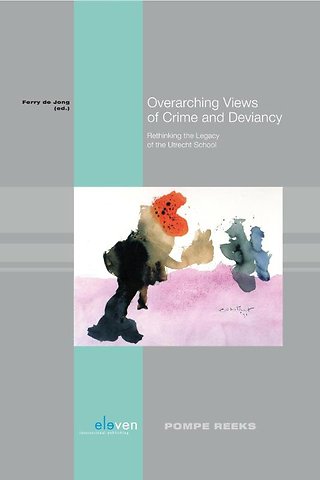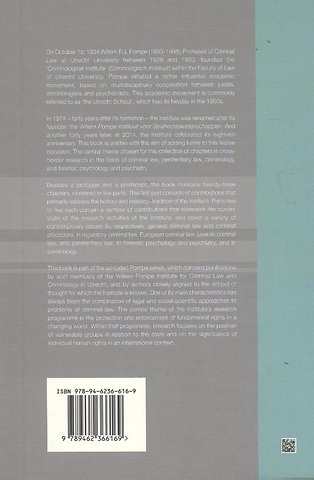



Ferry de Jong is hoogleraar strafrecht en strafprocesrecht aan de Universiteit Utrecht. Hij studeerde Nederlands recht en Scandinavische taal- en letterkunde (cum laude) aan de Universiteit van Amsterdam en aan de Universiteit van Bergen (Noorwegen) en promoveerde in 2009 aan het Willem Pompe Instituut voor Strafrechtswetenschappen in Utrecht (cum laude).
Meer over Ferry de JongOverarching Views of Crime and Deviancy
Rethinking the Legacy of the Utrecht School
Paperback Engels 2015 1e druk 9789462366169Samenvatting
On October 1st 1934 Willem P.J. Pompe (1893-1968), Professor of Criminal Law at Utrecht University between 1928 and 1963, founded the ‘Criminological Institute’ (Criminologisch Instituut) within the Faculty of Law of Utrecht University. Pompe initiated a rather influential academic movement, based on multidisciplinary cooperation between jurists, criminologists and psychiatrists. This academic movement is commonly referred to as ‘the Utrecht School’, which had its heyday in the 1950s.
In 1974 – forty years after its formation – the Institute was renamed after its founder: the Willem Pompe Instituut voor Strafrechtswetenschappen. And another forty years later, in 2014, the Institute celebrated its eightieth anniversary.
This book is written with the aim of adding lustre to this festive occasion. The central theme chosen for this collection of chapters is crossborder research in the fields of criminal law, penitentiary law, criminology, and forensic psychology and psychiatry. Besides a prologue and a postscript, the book contains twenty-three chapters, clustered in five parts. This first part consists of contributions that primarily address the history and research tradition of the Institute. Parts two to five each contain a number of contributions that represent the current state of the research activities at the Institute, and cover a variety of contemporary issues in, respectively, general criminal law and criminal procedure, in regulatory criminal law, European criminal law, juvenile criminal law, and penitentiary law, in forensic psychology and psychiatry, and in criminology.
Specificaties
Lezersrecensies
Inhoudsopgave
Ferry de Jong
1 On this volume and the occasion of its publication 1
2 Introductory notes on the chapters in this volume 5
3 Some methodological notes and words of thanks 16
Part I: Historical Reflections on Criminal Law Scholarship, Forensic Psychiatry, and Criminology
Chapter 1
Overarching Thought: Criminal Law Scholarship in Utrecht 21
Ferry de Jong & Constantijn Kelk
1 Preliminary notes 21
2 Chronological characterization: a history of the Institute 26
3 Thematic characterization: three constants in criminal law scholarship in Utrecht 47
4 Concluding observations 75
Chapter 2
The Boost of Forensic Psychiatry Embedded in Utrecht Cooperation 89
Frans Koenraadt
1 Introduction 89
2 Post-war expansion of forensic psychiatry 93
3 Connections between the university and the Observation Hospital 97
4 Research 99
5 Teaching forensic psychiatry 114
6 Developments 121
Chapter 3
Criminology at the Willem Pompe Institute of Utrecht University: The First Fifty Years 135
Frank Bovenkerk
1 Introduction 135
2 Criminography 136
3 Crime and religion (1938) 140
4 Criminal families in Utrecht (1940) 141
5 Female criminality (1940) 142
6 Dutch villages with a bad reputation 144
7 Rural-urban differentials in crime 145
8 Social deviance and crime among immigrants in Amsterdam 145
9 Crime under foreign occupation 146
10 Teaching during the second criminology period at the Willem Pompe Institute: 1967-1988 147
Chapter 4
Cultural Criminology Utrecht Style 151
Dina Siegel & Damián Zaitch
1 Introduction 151
2 The cultural criminological roots 152
3 Cultural criminology in the polder 155
4 Criminology in Utrecht 157
5 Current criminological research at Utrecht 162
6 Future challenges 168
Photographic Intermezzo 175
Part II: Contemporary Issues in General Criminal Law and Criminal Procedure
Chapter 5
Law Like Love 183
Stijn Franken & Petra van Kampen
1 The Utrecht School 183
2 The power of law 186
3 The ethics of conflict 189
4 Changing perspective(s) on mens rea 192
5 The rule of law 195
6 Law is the law 198
Chapter 6
The ‘Victim Paradigm’ in (International) Criminal Justice 203
Chrisje Brants
1 Introduction: a missed chance 203
2 Aspects of justice and criminal law 206
3 Victims, justice and international criminal law 208
4 Victims in the context of domestic criminal justice 211
5 Conclusions 223
Chapter 7
‘I Take You as my Lawfully Wedded Wife’ 231
Comparison and observations with regard to the penalization of forced marriages
Renée Kool
1 Introduction 231
2 Framing forced marriages as a social problem 233
3 The European standard 235
4 The Dutch legal discourse 236
5 The English legal discourse 239
6 The Dutch and English law in action 241
7 Some comparative observations 244
8 Conclusion 246
Chapter 8
The Tolerance of Intolerance 253
An evaluation of the scope of Articles 137c and 137d of the Dutch Criminal Code
Joske Graat & Marlien van Duursen
1 Introduction 253
2 Article 10 ECHR: general framework 255
3 The two provisions in a nutshell 256
4 The case law discussed 257
5 Conclusion 268
Chapter 9
Changing Ideas on Corporate Criminal Liability 271
A comparison between the Netherlands and England and Wales
Marjan Groenouwe & Esther Baakman
1 Introduction 271
2 The historical development of corporate liability in Dutch criminal law 272
3 The Dutch concept: a general provision on corporate criminal liability 274
4 Developments in English criminal law: vicarious liability and the identification principle 276
5 Recent developments: The Corporate Manslaughter and Corporate Homicide Act and (2007) the Bribery Act (2010) 278
6 Corporate criminal liability: towards a new method of attribution 281
7 Conclusion 283
Chapter 10
Corporate Intent: In Search of a Theoretical Foundation for Corporate Mens Rea 287
Mark Hornman & Eelke Sikkema
1 Introduction 287
2 Why business ethics as a frame of reference? 289
3 Two models of corporate criminal liability 290
4 Corporate criminal liability and intent in Dutch criminal law 293
5 Intentionality from an ethical perspective: function and meaning 298
6 Analysis and conclusions: significance for criminal law? 303
Chapter 11
The Role of Financial Capacity in Dutch Confiscation Law: Changes in Legislation and an Alternative Approach 311
Wouter de Zanger
1 Introduction 311
2 Dutch confiscation law 313
3 The role of financial capacity 316
4 Implications for the legal position of the convicted person 320
5 The role of future financial capacity: an alternative approach in light of a rehabilitative perspective 325
6 Conclusion 329
Part III: Contemporary Issues in Regulatory Criminal Law, European Criminal Law, Juvenile Criminal Law, and Penitentiary Law
Chapter 12
Criminal Law Enforcement of EU Harmonised Financial Policies: The Need for a Shared Criminal Policy 335
John Vervaele & Michiel Luchtman
1 Introduction 335
2 Enforcing financial regulations: the law in action 337
3 An EU-orientated criminal justice policy in the Netherlands? 343
4 An EU criminal justice policy? 354
5 Conclusions 360
Chapter 13
Juvenile Justice and Juvenile Crime: The Tradition and Topicality of an Interdisciplinary Approach 367
Ido Weijers, Stephanie Rap & Kristien Hepping
1 Introduction 367
2 Juvenile justice research in 80 years of the Willem Pompe Institute 367
3 Current research 373
4 Conclusion 380
Chapter 14
The Development of Rechtsburgerschap of Prisoners: A National and European Perspective 385
Pauline Jacobs
1 Introduction 385
2 The development of rechtsburgerschap in the Netherlands 386
3 The development of rechtsburgerschap: a European perspective 392
4 Concluding remarks 397
Chapter 15
Collateral Consequences and the Principle of Proportional Punishment 401
Miranda Boone & Elina Kurtovic
1 Introduction 401
2 Collateral consequences 402
3 Recent developments: four examples from practice 406
4 The Utrecht School and the notion of proportional punishment 408
5 The role of the criminal court judge 412
6 Discussion 416
Part IV: Contemporary Issues in Forensic Psychiatry and Psychology
Chapter 16
On (Free) Will 421
Antoine Mooij
1 Introduction 421
2 The phenomenology of will and of the freedom of will 422
3 The psychopathology of will 424
4 Some views of will and freedom of will 426
5 A combined theory 428
6 The meaning of interiority in criminal law 429
Chapter 17
Two Faces of Accountability: A Forensic Mental Health Perspective 435
Timon den Boer & Jos van Mulbregt
1 Introduction 435
2 Format of the discussions 437
3 First case: Bram 439
4 Second case: Willem 445
5 Conclusion 448
Chapter 18
Explaining Arson: A Cross-Border Theoretical Approach 455
Lydia Dalhuisen
1 Introduction 455
2 A criminological approach: routine-activities theory 456
3 A psychological approach: single-factor explanations 462
4 A psychological approach: multi-factor explanations 465
5 A psychopathological approach: disordered offenders 473
6 Conclusions 477
Part V: Contemporary Issues in Criminology
Chapter 19
The Label ‘Multi-Problem Family’: Still a Leading Concept for Future Policy Directives? 487
Tessa Verhallen
1 Introduction 487
2 Multi-problem families in the Netherlands 488
3 Historical and political context of the label multi-problem family 489
4 Multi-problem family: the literature and policy documents 491
5 International critique of the term ‘multi-problem family’ 499
6 Conclusion and discussion 501
Chapter 20
In the Wake of War: A Cultural Criminological Perspective on the Growth of the Sex Industry in Kosovo 507
Roos de Wildt
1 Introduction 507
2 The cultural criminological perspective 510
3 Meaning of post-war prostitution in Kosovo 511
4 Obscured causes for the growth of the Kosovar sex industry 515
5 Effects of a one-sided representation 521
6 Concluding remarks 523
Chapter 21
Mobility Rules. Migrants and Drifters Fare Well (?) in Post-Welfare Europe 527
Veronika Nagy & Brenda Oude Breuil
1 Amuse-gueules 527
2 Apéritive: mobility rules 528
3 Entrée: security and the representation of (un)deserving ‘denizens’ 530
4 Hors d’oeuvres: social sorting in the late modern bureaucratic field 535
5 Plat de résistance: innovative strategies to fare well ... and their unintended (?) consequences 540
6 Digestive: to see or not to see ... Conclusion and discussion 542
Chapter 22
Cultural Criminology and the Internet: Challenges for Online Criminological Research 547
Rosa Koenraadt
1 Introduction 547
2 Cultural criminology at the WPI 548
3 Illegal markets and the internet 550
4 Cultural criminology and the internet 552
5 Online market for illicit pharmaceuticals 554
6 Methodological challenges in the virtual world 557
7 Conclusion 560
Chapter 23
Towards Moral Principles Regarding Non-Human Animals: A Green Criminological Perspective 565
Daan van Uhm
1 Introduction 565
2 The emergence of green criminology 565
3 Moral principles and the human and non-human animal relationship 567
4 Trade in, exhibition and keeping of exotic non-human animals 570
5 Industrialization of non-human animals for food 574
6 Conflicting human interests, species justice and increasing moral principles 577
7 The ‘other’ victims 580
8 The future and green criminology 582
Postscript 589
Ferry de Jong
1 Introduction: from risks to crises 589
2 Dazzling modern complexities 591
3 Conceptual borders: responsibility and dehumanizing tendencies 593
4 Geographical borders: globalization and Europeanization 598
5 Scientific borders: multidisciplinarity and interdisciplinarity 600
6 Conclusion: from slavery to bravery 602
About the authors and editors 607
Vaak samen gekocht
Anderen die dit boek kochten, kochten ook
Rubrieken
- advisering
- algemeen management
- coaching en trainen
- communicatie en media
- economie
- financieel management
- inkoop en logistiek
- internet en social media
- it-management / ict
- juridisch
- leiderschap
- marketing
- mens en maatschappij
- non-profit
- ondernemen
- organisatiekunde
- personal finance
- personeelsmanagement
- persoonlijke effectiviteit
- projectmanagement
- psychologie
- reclame en verkoop
- strategisch management
- verandermanagement
- werk en loopbaan


